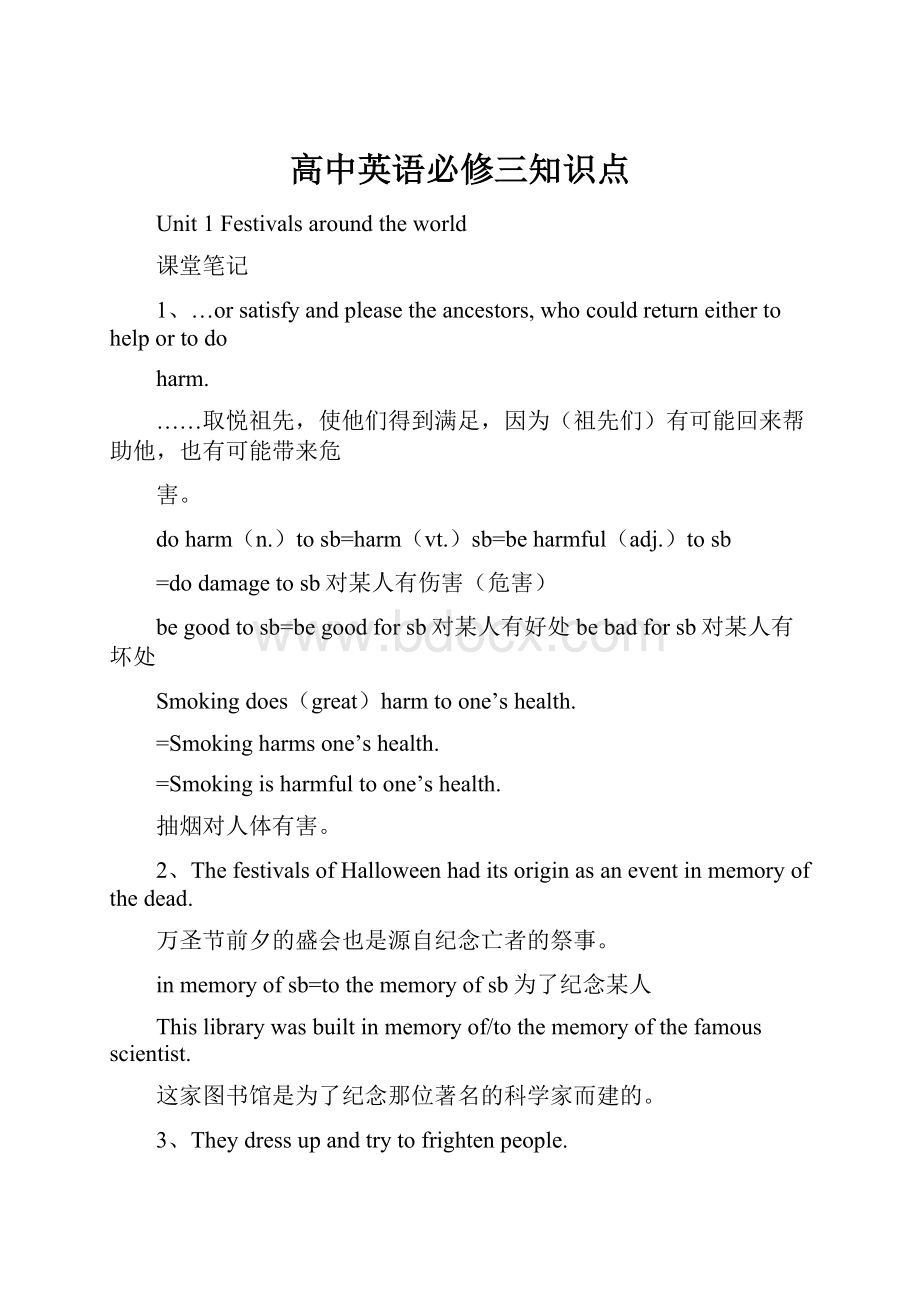高中英语必修三知识点.docx
《高中英语必修三知识点.docx》由会员分享,可在线阅读,更多相关《高中英语必修三知识点.docx(38页珍藏版)》请在冰豆网上搜索。

高中英语必修三知识点
Unit1Festivalsaroundtheworld
课堂笔记
1、…orsatisfyandpleasetheancestors,whocouldreturneithertohelportodo
harm.
……取悦祖先,使他们得到满足,因为(祖先们)有可能回来帮助他,也有可能带来危
害。
doharm(n.)tosb=harm(vt.)sb=beharmful(adj.)tosb
=dodamagetosb对某人有伤害(危害)
begoodtosb=begoodforsb对某人有好处bebadforsb对某人有坏处
Smokingdoes(great)harmtoone’shealth.
=Smokingharmsone’shealth.
=Smokingisharmfultoone’shealth.
抽烟对人体有害。
2、ThefestivalsofHalloweenhaditsoriginasaneventinmemoryofthedead.
万圣节前夕的盛会也是源自纪念亡者的祭事。
inmemoryofsb=tothememoryofsb为了纪念某人
Thislibrarywasbuiltinmemoryof/tothememoryofthefamousscientist.
这家图书馆是为了纪念那位著名的科学家而建的。
3、Theydressupandtrytofrightenpeople.
他们乔装打扮去吓唬人。
dressv.穿衣;给某人穿衣n.衣服
eveningdress晚礼服
dressup;towearone’sbestclothes穿上盛装
①Dressquickly,oryou’llbelate.
②Theboyisoldenoughtodresshimself.
③Themiddle-agedwomanisdressedinalongcoat.
④Theydressedupfortheirwedding.
4、InChinaandJapantherearemid-autumnfestivals,whenpeopleadmirethemoon
andgivegiftsofmooncakes.
在中国和日本都有中秋节,这时,人们会赏月,并互赠月饼。
admiresborsth钦佩(赞赏)某人或某物
admiresbforsth羡慕某人的某物
Tobehonest,weadmirehishandwritingverymuch.
=Tobehonest,weadmirehimforhishandwritingverymuch.
说实话,我们非常羡慕他的书法。
admirern.赞赏者,敬慕者admirationn.赞赏,羡慕
相关链接:
praisesbforsth为某事表扬某人
punishsbforsth为某事惩罚某人
scoldsbforsth为某事责备某人
5、Themostenergeticandimportantfestivalsaretheonesthatlookforwardtothe
endofwinterandtothecomingofspring.
最富有生气而又最重要的节日就是告别冬天迎来春天的日子。
lookforwardtosthordoingsth
盼望某事或盼望干某事
to在这里是介词,后面接名词或动词的ing,不能接动词原形。
ManypeoplelookforwardtovisitingtheGreatWall.
很多人盼望参观长城。
这类短语还有:
beusedto习惯于payattentionto注意stickto坚持leadto导致
referto参阅devoteto贡献;奉献adaptto适应
6、Thecountryiscoveredwithcherrytreeflowerssothatitlooksasthoughit
mightbecoveredwithpinksnow.
整个国度处处都是樱花盛开,看上去就像罩上了一层粉红色的雪。
asthough=asif似乎,好像
①ThegirlspeaksEnglishsowellasif/asthoughshewereborninEngland.
②Itlooksasifheweredrunk.(虚拟语气,没醉)
③Itlooksasifheisdrunk.(真实语气,醉了)
语法:
Modalverbs(Ⅰ)情态动词Ⅰ
情态动词
否定式
缩略形式
情态动词
否定式
缩略形式
can
cannot/cannot
can’t
should
shouldnot
shouldn’t
could
couldnot
couldn’t
will
willnot
won’t
may
maynot
mayn’t
would
wouldnot
wouldn’t
might
mightnot
mightn’t
need
neednot
needn’t
must
mustnot
mustn’t
dare
darenot
daren’t
shall
shallnot
shan’t
oughtto
oughtnotto
oughtn’tto
重点:
一、易混淆的情态动词
1、can,could/beableto
can,could表示“潜在的能力”、“许可”(不如may正式)、“可能性”等;用于一般现
在时和一般过去时。
beableto表示“已经实现的能力”,可用于多种时态。
①IhavebeenabletoswimsinceIwassixyearsold.(could/havebeenableto)
②Sheisn’tgoodatmath,butshewasabletopasstheexamyesterday.(could/
wasableto)
2、must/haveto
must表示“一定”,“必须”,表示说话人的主观看法。
而haveto表示客观需要,是“不
得不”的意思。
①It’sgettingdarkeranddarker,soyoumusthurry.(must/haveto)
②It’sgettingdarkeranddarker,sowehavetohurry.(must/haveto)
3、will/shall
征求他人意见时,will用于第二人称,shall用于第一和第三人称。
①Everybodyishere.Shallwestartthemeeting?
(shall/will)
②Therearetoomanypeopleinside.Will/Wouldyoupleasespeaklouder?
(will/would/shall)
4、would/usedtodo
都有“过去常常干”的意思,但usedtodo指“过去常干,现在不干了”,强调比较;
而would不强调比较,带有感情色彩。
①Bobusedtoworkhere,buthehasmovedtoanotherplace.(would/usedto)
②Theoldwomanwouldsitbythewindowforhours,missingherchildren.
(would/usedto)
5、dare/need
这两个动词既可以作情态动词,又可以作实意动词。
特点:
need/dare后接动词原形时是情态动词;接动词不定式或名词时是实意动词。
①Theydarenotgothereagain,darethey?
(do/dare)
②Youneedanewcomputer,don’tyou?
(needn’t/don’t)
③Theboyneedstoseeadoctor,doesn’the?
(needn’t/doesn’t)
二、问答中的情态动词
重点:
否定回答中容易出错
提问
回答
may
mustn’t
must
needn’t/don’thaveto
could
can
might
may
would
will
三、表推测的情态动词(Unit2中讲解)
练习
①—CouldIuseyourbicycle?
—Yes,youC.
A.couldB.mayC.canD.are
②Therewasaterriblefirelastnight,buteverybodyBescape.
A.canB.wasabletoC.couldD.might
③—MayIgooutandplaybasketballforawhile?
—No,youC.
A.maynotB.mayn’tC.mustn’tD.needn’t
④Mymotheristoobusynow.IClendherahand.
A.mustB.mayC.havetoD.can
⑤—Mustwegetherebeforeeighttomorrowmorning?
—No,youC.
A.mustn’tB.havetoC.needn’tD.maynot
⑥It’stoohotinsidenow.BTomopenthewindow?
A.WillB.ShallC.DoesD.Must
⑦Wearedoingourhomework.Byouturndowntheradio?
A.ShallB.WillC.MustD.Should
⑧Asastudent,youBhandinyourhomeworkontime.
A.mayB.shouldC.canD.might
重点词汇
1、takeplace/takeone’splace/taketheplaceof
①Thistookplacethreedaysago.
②Mr.Smithisillandanotherteacherhastotakehisplace.
③Greatchangeshavetakenplaceinourcountrysince1977.
2、starve/gohungry
①Intheolddaysmanypeoplewenthungryandstarvedtodeath.
②Thehomelesschildrenwerestarvingforlove.(渴望得到)
3、playatrickonsb=playajokeonsb
①Heenjoysplayingtricksonstrangers.(plays/playing)
②It’swrongofyoutoplayajokeonsuchalittlegirl.(toplay/play)
4、custom/habit
①You’dbettergiveupthebadhabitofsmoking.
②It’scustomforChinesepeopletotakeofftheirshoeswhentheygetintoa
hall.
5、award/prize
①Thejudges(评委)awardedherthefirstprizeforherpicture.
②Inthiscompetitionhehaswona(an)prize/awardof10,000dollars.
6、cloth/clothing/clothes
①Hiscoatismadeoffinecloth,soitisexpensive.
②Areyougoingtotheclothingshoptobuytrousers?
③Putonmoreclothes,oryou’llcatchacold.
7、permit/permission
①Withmymother’spermission,Iboughtanewcomputer.
②Ifmymotherpermits,I’llbuyanewcomputer.
8、turnup/turndown
turnup向上翻,出现;提高音量
turndown降低音量;拒绝
①Wewaitedandwaited,buthedidn’tturnup.
②Turnuptheradiosothateveryonecanhearthenews.
③Igavehimsomeadvicebutheturneditdown.(拒绝)
9、lovely/lively
①Theclasseshetaughtwerelivelyandinteresting.
②Whatalovelydayitis!
Let’sgoouting.
Unit2Healthyeating
课堂笔记
1、Hisrestaurantoughttobefullofpeople.
他的餐厅本来应该宾客盈门的。
befullof=befilledwith充满,装满
fill...with...用……把……装满(填满)
①Thebuswastoocrowdedbecauseitwasfullofpassengers.(=wasfilledwith)
班车很拥挤,因为人太多。
②Theroomisfilledwithlaughter.(=isfullof)
房间里充满了笑声。
③Willyoupleasefillmyglasswithwater,Tom?
汤姆,把我杯子里的水装满好吗?
2、Whatcouldhavehappened?
发生了什么事?
“Nothingcouldhavebeenbetter,”hethought.
他想,“再没有什么比这更好吃的了。
”
SomethingterriblemusthavehappenedifLichangwasnotcomingtoeatwithhim
ashealwaysdid.
要是李昌不像往常那样到他店里吃饭,那问题一定严重了。
情态动词+havedone表示对过去已经发生的事进行推测。
musthavedonesth一定已经干了某事,must只能用于肯定;can’thavedonesth
不可能已经干了某事,can用于否定和疑问;may/mighthavedone可能(也许)干了某
事,may/might用于肯定或否定。
①Mr.Zhangisbusyinthenextroom.HeCtoAmerica.
A.mustn’thavegoneB.can’tgo
C.can’thavegoneD.mayhavegone
②Herunclecoughsdayandnight.HeCabadcold.
A.canhavecaughtB.mustcatch
C.mayhavecaughtD.maycatch
③Bobhasn’tcomebackyet.Bhehavegotintotrouble?
A.MustB.CanC.MayD.Might
3、Tiredofallthatfat?
Wanttoloseweight?
肥腻的东西吃厌了吧?
想变瘦吗?
betiredofsthordoingsth讨厌、厌倦干某事
betiredfromsthordoingsth因干某事而劳累
有时介词from也可换用with,但少用
①Totellyouthetruth,I’mtiredoflisteningthiskindofmusic.
实话实说,我讨厌听这种音乐。
②LiDongissleepyinclass.Maybeheistiredfromplayingfootball.
李东课堂上很疲倦,可能是踢足球踢累了。
4、WangPengwasamazedatthisandespeciallyattheprices.
王鹏对此感到吃惊,特别是对它的价格。
beamazed/surprised/astonishedat对……感到吃惊。
短语中的介词at表示原因
5、Hecouldn’thaveYongHuigettingawaywithtellingpeoplelies!
他可不能让雍慧哄骗人们!
havesb/sthdoingsth允许或容忍某人/某事(继续下去)
havesb/sthdone让别人干某事(自己不干)
havesbdosth使某人干某事(=makesbdosth)
①Savewater!
Don’thaveitrunningalldaylong.
节约用水哟!
不要让水一天到晚地流。
②You’dbetterhaveyourbicyclerepairedassoonaspossible.
你最好尽快请人把自行车修一下。
③Theteachermademecopymycompositionagain.
老师要我把作文再抄写一遍。
6、Itwasnotgivingitscustomersenergy-givingfood.
它提供给顾客吃的食物没有热量。
WangPengfollowedLiChangintoanewly-openedsmallrestaurantattheendof
thestreet.
王鹏跟着李昌来到街尾一家新开张的小餐馆。
energy-givingfood(复合词,食物与提供是主动关系,用-ing)
anewly-openedsmallrestaurant(复合词,餐馆和包办是被动关系,用-ed)
ahand-madebag手工制作的包(被动关系)
meat-eatinganimals食肉动物(主动关系)
练习:
勤劳的工人hard-workingworkers;爱好和平的人们peace-lovingpeople;
新生婴儿anew-bornbaby
7、Perhapshewouldbeabletoearnhislivingafterallandnothavetoclosehis
restaurant.
也许他仍然能够谋生,而不必关闭自己的餐馆。
earna/one’sliving=makea/one’sliving=getmoneybydoingsth谋生
Asyouknow,taxidriversmake/earntheirlivingbydriving.
你是知道的,的士司机靠开车过活。
练习:
农民靠种地过活。
Farmersmakealivingbyfarming.
8、Hedidnotlookforwardtobeingindebtbecausehisrestaurantwasnolonger
popular.
他可不希望由于餐馆不受欢迎而负债。
indebt负债introuble在困难中indanger在危险中inneed需要=indemand
这些短语中的介词in表示状态
情态动词
肯定
否定
疑问
must
√
can
√
√
could
√
√
√
may
√
√
might
√
√
语法:
表示推测的情态动词(Ⅰ)
“情态动词”加上havedone,推测事情已经完成;
“情态动词”加上bedoing,推测事情正在进行。
练习:
①It’sSundaytoday,soI’msureLiDongCat
school.
A.can’tB.mustn’tC.can’tbeD.must
②It’srainingcatsanddogsnow.WhoBcomehereinsuchbadweather?
A.mayB.canC.mightD.must
③MymotherBcomebackhomeontime,butI’mnotsure.
A.mustB.mightC.can’tD.can
④Bobfellasleepinclass.HeDbeverysleepy.
A.canB.maynotC.can’tD.must
表示推测的情态动词(Ⅱ)
musthavedonesth一定已经干了某事
may/mighthavedonesth也许已经干了某事
can’thavedonesth不可能已经干了某事
couldhavedonesth有可能已经干了某事;本来有可能干但没干某事
should/oughttohavedonesth本来应该干但没干某事
needn’thavedonesth本来不必干但干了某事
练习:
①It’seleveno’clocknow.MyparentsCtobed.
A.mustgoB.maygoC.musthavegoneD.mustn’thavegone
②Myuncleisbusyinthenextroom.HeCabroad.
A.mustn’thaveflownB.can’tflyC.can’thaveflownD.mayhaveflown
③Youfailedagaininmath.YouChardbutyoudidn’t